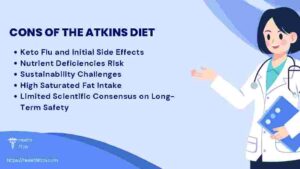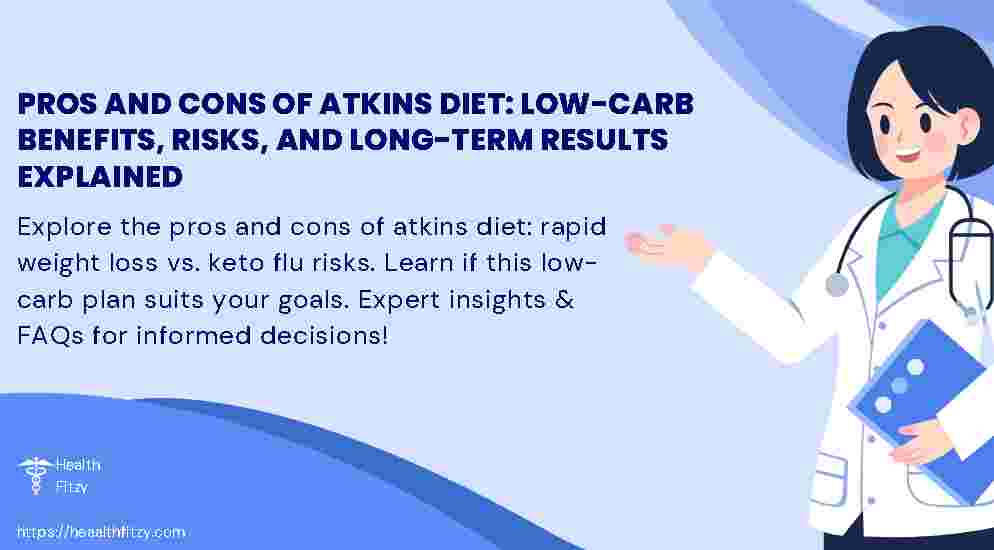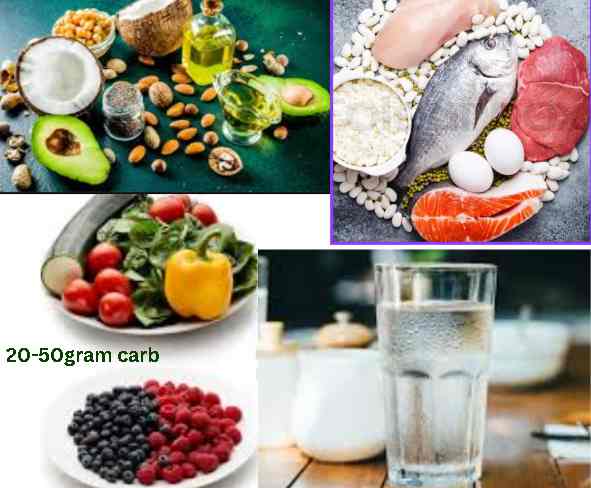pros and cons of atkins diet: Low-Carb Benefits, Risks, and Long-Term Results Explained
The Atkins Diet: Pros, Cons, and What You Need to Know
Atkins diet pros and cons: Since the 1970s, the Atkins Diet, a cutting-edge low-carb eating regimen, has been a mainstay in the weight loss industry. Designed by Dr. Robert Atkins, it emphasizes protein, healthy fats, and minimal carbohydrates to trigger fat-burning ketosis. While it’s praised for rapid weight loss and metabolic benefits, critics highlight potential downsides like nutrient deficiencies and sustainability challenges. Below, we break down the pros and cons of the Atkins Diet in detail, offering a balanced perspective to help you decide if it aligns with your health goals.
Pros of the Atkins Diet

-
Effective Weight Loss
The Atkins Diet is renowned for rapid initial weight loss, especially during its strict Phase 1 (Induction). By slashing carbs to 20–25 grams daily, the body enters ketosis, burning stored fat for energy. According to studies, low-carb diets, such as the Atkins diet, can cause weight loss more quickly in the short term than low-fat diets. -
Reduced Hunger and Cravings
High protein and fat intake promote satiety, reducing hunger hormones like ghrelin. Unlike calorie-restricted diets, Atkins followers often feel fuller longer, making adherence easier. -
Improved Metabolic Health
Low-carb diets may lower triglycerides, boost HDL (“good” cholesterol), and stabilize blood sugar levels. Research links Atkins to better insulin sensitivity, benefiting those with type 2 diabetes or prediabetes. -
Flexible Food Choices
Unlike rigid meal plans, Atkins allows fatty meats, fish, eggs, cheese, and non-starchy veggies. Later phases reintroduce carbs like berries and legumes, offering gradual flexibility. -
No Calorie Counting
The diet focuses on macros (carbs, protein, fat) instead of calories, simplifying meal planning for those who dislike tracking every bite.
Cons of the Atkins Diet

-
Keto Flu and Initial Side Effects
Cutting carbs abruptly can cause headaches, fatigue, nausea, and brain fog (“keto flu”) as the body adapts to ketosis. These symptoms usually subside within a week but may deter beginners. -
Nutrient Deficiencies Risk
Restricting fruits, grains, and legumes in early phases may lead to low fiber, vitamin C, and potassium. Long-term, this raises risks of constipation, weakened immunity, or electrolyte imbalances. -
Sustainability Challenges
The strict Phase 1 can feel overly restrictive, leading to burnout or rebound weight gain if old eating habits resume post-diet. -
High Saturated Fat Intake
While Atkins encourages healthy fats, overconsumption of red meat and full-fat dairy may raise LDL (“bad” cholesterol) in some individuals, posing cardiovascular risks. -
Limited Scientific Consensus on Long-Term Safety
Long-term effects of ultra-low-carb diets remain debated. Some studies suggest potential kidney strain from high protein intake or bone density loss due to reduced calcium absorption.
Who Should Avoid the Atkins Diet?
-
People with kidney disease (due to high protein).
-
Pregnant or breastfeeding women.
-
Individuals with a history of disordered eating.
-
Those on certain medications (e.g., diabetes drugs requiring carb intake adjustments).
FAQs About the Atkins Diet
1. Does the Atkins Diet work for long-term weight loss?
While effective short-term, long-term success depends on transitioning to balanced carb intake in later phases and maintaining lifestyle changes.
2. Is the Atkins Diet safe for heart health?
Opt for lean proteins and unsaturated fats (avocado, olive oil) over processed meats to minimize heart risks. Monitor cholesterol levels with a healthcare provider.
3. Can vegetarians follow the Atkins Diet?
Yes, but it’s challenging. Focus on plant-based proteins like tofu, tempeh, and low-carb veggies, though Phase 1 restrictions may limit options.
4. How does Atkins differ from Keto?
Both are low-carb, but Keto maintains strict carb limits (20–50g daily) indefinitely, while Atkins gradually increases carbs across four phases.
5. What foods are forbidden on Atkins?
Phase 1 bans sugar, grains, legumes, starchy veggies, and most fruits. Later phases reintroduce limited carbs like berries and quinoa.
Conclusion: Is the Atkins Diet Right for You?
The Atkins Diet offers a structured, science-backed approach to weight loss and metabolic health, particularly for carb-sensitive individuals. However, its restrictive nature and potential side effects require careful consideration. For sustainable results, pair it with whole foods, regular exercise, and medical guidance.
4 phases of atkins diet
4 phases of atkins diet: You have to adhere to the diet regimen for seven days. Different Atkins plans and phases may call for different kinds and quantities of compliant foods. But generally speaking, when following the Atkins diet, you may expect to eat the following things. The following are the stages of the Atkins Diet:
First Phase: Induction
The most restrictive stage is this one. For two weeks, you should limit your daily intake of net carbs to no more than 20g. You can consume high-protein meals like eggs, fish, chicken, pork, and certain vegetables that grow above ground at this time.
Phase Two: Equilibrium
During this phase, you skip white bread, rice, and other grains while progressively increasing your daily carbohydrate consumption to 25–50g. You will also include low-carb fruits, nuts, and seeds.
Phase 3: Pre-maintenance and fine-tuning
During this phase, you will try a variety of carbohydrate intakes until you discover the one that suits you the best and enables you to keep your weight stable without feeling restricted.
Phase Four: Upkeep
This is the stage when you will keep eating the same mix of meals while keeping an eye on your weight and carbohydrate intake levels after you have achieved your target weight. To maintain a healthy lifestyle and reap the benefits of the Atkins diet, this is intended to be a lifelong commitment.
is the atkins diet healthy
Is the atkins diet healthy: The Atkins Diet, a low-carb plan emphasizing protein and fats, can offer short-term benefits like rapid weight loss and improved blood sugar control. By restricting carbs to 20–25 grams initially, it triggers ketosis, burning fat for energy. Studies suggest it may reduce hunger and improve triglycerides and HDL cholesterol. However, its long-term health impacts are debated.
The strict early phase limits fruits, whole grains, and legumes, risking deficiencies in fiber, vitamins, and minerals. High intake of saturated fats from red meat and full-fat dairy may raise LDL cholesterol, potentially increasing heart disease risk. While effective for some, especially those with insulin resistance, critics argue it’s hard to sustain and may lead to rebound weight gain. The diet’s later phases reintroduce carbs, promoting balance, but adherence varies.
Consult a healthcare provider before starting, particularly if you have kidney issues or cardiovascular concerns. Overall, the Atkins Diet can be a tool for weight loss but requires careful planning to ensure nutritional adequacy (Nutrition Products) and long-term health.
does atkins diet work
The Atkins Diet can be effective for short-term weight loss and improving metabolic health, particularly for individuals sensitive to carbs. By drastically reducing carbohydrates (20–25g net carbs initially), the body enters ketosis, burning fat for energy instead of glucose. Studies show it may lead to faster initial weight loss compared to low-fat diets, while reducing hunger and stabilizing blood sugar levels. However, long-term success varies.
Critics note potential challenges like nutrient deficiencies, sustainability issues, and risks of high saturated fat intake, which could impact heart health. While many lose weight in the early phases, maintaining results requires transitioning to balanced carb intake in later stages and adopting lifelong habits. For those with insulin resistance or type 2 diabetes, it may offer benefits, but consulting a healthcare provider is crucial to address individual health needs and risks.
How to Start a Keto Diet for Beginners: Simple Meal Plan
atkins diet menu




Pingback: what is the best intermittent fasting window to lose belly fat
Pingback: Best Strength Training Exercises for Menopause: Boost Health, Strength, and Confidence